|
Book Reviews
Latest addition 10 September 2012 |
|
These are short reviews or descriptions of books I have found
especially interesting.
They are
all non-fiction -- science, history, sociology, biography and politics.
All of these books are available on Kindle.
Return to
Main Directory |
 |
|
 |
|
Midnight in México
By
Alfredo Corchado
Print and e-books
Corchado in a dual citizen (actually a dual national) of the USA,
where he was born, and México, the land of his ancestors and the
land of his heart. He is head of the México City office of the
Dallas Morning News. He has written extensively about ordinary life
in México as well as the drug wars.
This
is a powerful and amazing book about Mexico written with the blood,
sweat and tears of someone who knows Mexico as it once was, as it
now is and dreams of a better future. |
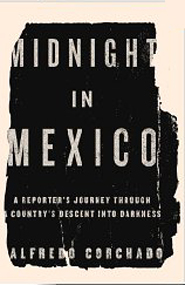 |
|
I
have lived in Mexico for 13 years. I have seen my quiet, peaceful
little corner of México erupt into a shooting war between drug
gangs, the police and the army. So this book has a special
meaning for me.
Corchado combines a personal memoir with excellent reporting on the
drug wars. He gives a usefully history of the rise of the drug
gangs beginning in the 1940s. It began with considerable collusion
between the drugers and the government. Today, the government is
fighting the gangs, but there are so many corrupt officials at all
level of government that the war on drugs has become an uphill
battle for the government. No one seems to see a way out.
He
is an excellent writer who expresses himself with a journalist's
precision but also with a humanist's voice. The book touched me
profoundly, as a lament for a Mexico that once was, and as a
yearning for a Mexico that once again could be. A must read for
anyone who loves Mexico. |
|
 |
|
Mañana Doesn't Mean Tomorrow
By David Kindopp
Paperback and
Kindle
The dictionary
says mañana means tomorrow. Those of us who live in México clearly
understand that it means “not today.” Getting to understand the
Mexican concepts of time and punctuality are part of the challenge
of leaning a new culture.
This book is the
story of a man who walks away from his California life to follow his
dream--starting a charter sailboat business in Mexico. |
 |
|
Through all his
ensuing elations, machinations, and frustrations in love, in
friendship, and in business, The author shows us a Mexico most
tourists never see, a Mexico in which he discovers why mañana
doesn't mean tomorrow.
His story is
funny, entertaining and informative. |
|
 |
|
No Easy Day
By Mark Owen (a nom de plume) and
Kevin Maurer
Print and e-books
Mark Owen is a former member of the
United States Naval Special Warfare Development Group, commonly
known as SEAL Team Six. In his many years as a Navy SEAL, he has
participated in hundreds of missions around the globe, many of which
he relates in the book.. Owen was a team leader on the operation
which resulted in the death of Osama bin Laden. |
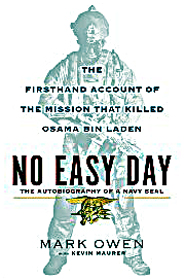 |
|
Kevin Maurer has covered special operations forces for nine
years. He has been embedded with the Special Forces in
Afghanistan six times, spent a month in 2006 with special operations
units in east Africa, and has embedded with U.S. forces in Iraq and
Haiti. He is the author of four books, including several about
special operations.
Together this warier and wariers' scribe have produced a gripping
page-turner that covers much more than just the Ben Laden story.
It follows Owen from his childhood dream of military service through
the riggers of SEAL training and several missions in Afghanistan and
other places. It ends with the minute-by-minute telling
of the Ben Laden story
Owen
writes "To date, how the mission to kill Bin
Laden has been reported is wrong. Even reports claiming to have the
inside story have been incorrect. I felt like someone had to tell
the true story. To me, the story is bigger than the raid itself and
much more about the men at the command who willingly go into harm’s
way, sacrificing all they have to do the job. Theirs is a story that
deserves to be told, and told as accurately as possible." |
|
 |
|
Cronkite
By Douglas Brinkley
Print and e-books
Dr. Brinkley is a professor of history at Rice University in
Houston. He is the author of several popular books.
This book brought back many fond memories from
my own days in broadcasting. I learned lots of personal things
about Uncle Walter. It's common knowledge that he was an avid
sailor, but did you know he was an accomplished drummer who spent
many drum jams with the drummer from the Grateful Dead? |
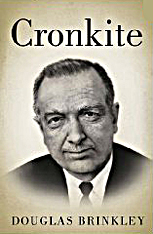 |
|
But the book has many irritating flaws. In many
places it reads like a first draft in serious need of an editor.
There are abrupt subject changes without transitions. The time
line is often very confusing. Some knowledgeable reviewers
have pointed out many factual errors.. Example
here.
I felt several people, Edward R. Morrow for
example, were treated unfairly.
While I found the book interesting and
informative, a better product would be expected from a writer of
Brinkley's stature.
Return to Main
Directory |
|
 |
|
Private Empire ExxonMobil
and American Power
By Steve Coll
Print and e-books
Steve Coll is most recently the author of the
New York Times bestseller The Bin Ladens. He is the president of the
New America Foundation, a non-partisan public policy institute in
Washington, D.C., and a staff writer for The New Yorker. He worked
for twenty years at The Washington Post, where he received a
Pulitzer Prize.
|
 |
|
This is the extraordinary story of both
ExxonMobil and the global oil industry beginning with the Exxon
Valdez accident in 1989 and leading to the Deepwater Horizon
oil spill in the Gulf of Mexico in 2010.
Along the
way, Coll constructs detailed scenarios that reveal the issues
confronting the company in a number of countries where it sources
oil or gas. Chad, Venezuela, Equatorial
Guinea, Russia, Iraq, and Qatar, among others, making clear that ExxonMobil's
interests were global, not national.
Though the book is subtitled
ExxonMobil and American Power, Coll makes clear that the corporation
is anything but an expression of American power. In fact, he details
the sometimes fractious relationship the company had even with the
oil-friendly Administration of George W. Bush, despite ExxonMobil
president Lee Raymond's
close friendship with Vice President Dick Cheney.
The overall picture is not very nice -- a
drive for profit above all else, and a constant battle to find, buy
or grab oil and gas reserves for future exploitation.
The book details the company's long-standing
fight against the concept of global climate change. A policy
only recently and reluctantly abandoned after spending millions
lobbing against the idea.
Return to Main
Directory |
|
 |
|
Gardens of
Democracy
By Eric Liu and Nick Hanauer
Print and e-books
Eric Liu is an author, educator, and civic
entrepreneur. He lives in Seattle, where he teaches at the
University of Washington and hosts an acclaimed television interview
program called Seattle Voices.
Nick Hanauer is a Seattle-based entrepreneur,
venture capitalist, author and activist with a knack for identifying
and building transformative
business models |
 |
|
The authors have given us a thought-provoking
little book that address the central issues of governance, the
economic vitals and citizen responsibilities in modern America.
Washington Post columnist
E.J. Dionne Jr. writes “Eric Liu and Nick
Hanauer are progressives who always think outside the box, and
that’s why everyone should pay attention to them. The Gardens of
Democracy shakes up our stale debate over government’s role in a
dynamic society, and in a thoughtful, creative and inventive way.
Everyone will find something to disagree with here, and that’s the
point: getting us out of our comfort zones is an immensely useful
democratic undertaking.”\
Return to Main
Directory |
|
 |
|
The Art of
Intelligence -- Lessons
from a Life in the CIA's Clandestine Service
By Henry A. Crumpton
Print and e-books
Crumpton
first applied for a job at the CIA when he was 10 years old.
He revived a letter suggesting he apply again when he was older,
which he did after college in 1981 and spent most of his 24 year
career working undercover
in Africa,
Europe
and Asia. He became a
master at recruiting spies to work fur the CIA. In the later part of his
career, he served in management at CIA headquarters.
|
 |
|
He was one of the
fathers of the Predator drone program. He explains how and why
the CIA came to develop and operate the drones.
I was
particularly fascinated by the CIA's leading role in routing the
Taliban and al-Qaeda which Crumpton directed in 2001-2002.
In 2005, he
left the CIA to work for the State Department with the rank of
ambassador-at-large from August 2005 until February 2007
He is was awarded the Distinguished Intelligence Medal, the CIA's
highest award for achievement.
The author
relates many of his adventures and, sometimes, misadventures.
Each story illustrates a point in the art and craft of intelligence
gathering. Of course, names, places and dates are almost never
reported. As required by law, the manuscript was reviewed by
the CIA before publication.
I found the book
quite interesting and very informative. I have a much better
understanding and appreciation of the role of the CIA.
Return to Main
Directory |
|
 |
|
The Passage of
Power
By Robert Caro
Print and e-book
This is volume 4 of a soon to
be 5 volume epic The Years of Lyndon
Johnson
The Passage of Power takes us
from the 1960 presidential primaries through the first seven weeks
of Johnson's presidency. It covers the shortest period of time of
any of the books in the series, but it's also the most interesting.
|
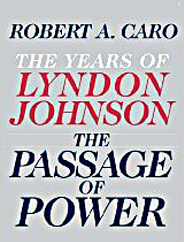 |
|
The Passage of Power is divided into five parts:
-
Johnson v. Kennedy 1960 (the 1960
democratic nomination fight),
-
"Rufus Cornpone" (Johnson's misery as vice
president),
-
Dallas (the assassination of Kennedy),
-
Taking Command (Johnson's actions in the days
immediately following the assassination),
-
To Become a President (the rest of the first
seven weeks of Johnson's presidency ending with the 1964 State
of the Union address to congress.)
Caro is a diligent researcher and a master story
teller. In many parts, the story reads like a novel. We
see LBJ sink to the depths of despair as vice-president and then to
rise to the pentacle of power as president. His gusto
restored, he set out to transform the nation. Volume 5 will
tell that story as well as the tragedy that was Viet Nam, the war
that ended his presidency.
Return to Main
Directory |
|
 |
|
Cyber
War: The Next Threat to National Security and
What to Do About It
Richard A
Clarke and Robert K. Knake
Print and
e-books
Richard A.
Clarke has served in the White House for Presidents Ronald Reagan,
George H. W. Bush, George W. Bush, and Bill Clinton, who appointed
him to be the National Coordinator for Security, Infra-structure
Protection, and Counter-terrorism. He teaches at Harvard
University’s Kennedy School of Government. |
 |
|
Robert K. Knake
is an international affairs fellow at the Council on Foreign
Relations.
[This review consists of quotes from the book
with a comment by me in brackets]
Cyber war has
begun. In anticipation of hostilities, nations are already
“preparing the battlefield.” They are hacking into each other’s
networks and infrastructures, laying in trapdoors and logic
bombs—now, in peacetime. This ongoing nature of cyber war, the
blurring of peace and war, adds a dangerous new dimension of
instability.
We really do
not know who would win, nor what the results of such a cyber war
would be.
We need to
embark on a complex series of tasks::
-
to
understand what cyber war is,
-
to learn
how and why it works,
-
to analyze
its risks,
-
to prepare
for it,
-
to think
about how to control it.
This book is an
attempt to begin to do some of that.
[The book is thought provoking as well as damn
scary.]
Return to Main
Directory |
|
 |
|
Do Not Ask What Good We Do
Inside the U.S. House of Representatives
By Robert Draper
Print and Kindle
Most of the book consists of short
biographical vignettes of house members -- mostly the freshmen of
2010. Some of these bios are really not very useful; others do
help to understand the power of the Tea Party who pushed the nation
to the brink of default on it's obligations.
Along the way, we get so see a lot of inside
activities of the House GOP. |
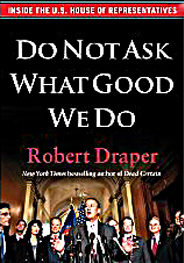 |
|
It's not always pretty to see the 112th House of
Representatives warts and all. Draper reveals the way the house
changed from a functioning body of deal makers to a frozen
bureaucracy.
Return to Main
Directory |
|
 |
|
Beyond Outrage
What has gone wrong with our
economy and how it fix it
By Robert Reich. PhD
Kindle and Nook, no print
In this short
monograph, Dr. Reich urges Americans to get
beyond mere outrage about the nation’s
increasingly concentrated wealth and corrupt
politics in order to mobilize and to take
back our economy and democracy.
Reich connects the
dots for us, showing why the increasing
share of income and wealth going to the top
|
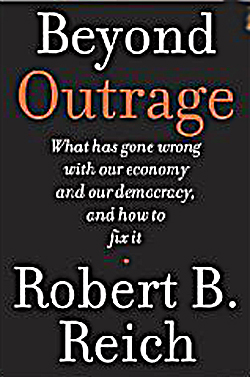 |
|
has hobbled jobs and growth for everyone else, while undermining our democracy;
has caused Americans to become increasingly cynical about public
life; and has turned many Americans against one another.
He also explains why the proposals of the
“regressive right” are dead wrong and provides a clear road map for
what must be done instead. Here is a blueprint for action for
everyone who cares about the future of America.
Return to Main
Directory |
|
 |
|
Showdown:
The Inside Story of How Obama Fought Back Against Boehner, Cantor,
and the Tea Party
By David Corn Print and Kindle
I am not a big fan of the usual "Inside
Washington or White House" books that so often tell us little more
the personality conflicts, turf wars and general gossip.
This book is different. Personality
conflicts and turf wars are ignored except where they have a direct
bearing on the president's battle with a radicalized and
dysfunctional congress. |
 |
|
The story deals with just one year, 2011,
starting with the lame duck session at the end of 2010 after the
Republican sweep of the House elections.
Corn is not an Obama apologist. He reports
successes and failures, scoops and near misses, blunders and
triumphs. I found answers to questions I had wondered about at
the time -- Why did he do that? Why didn't he do this?
Altogether, a very enlightening read.
Return to Main
Directory |
|
 |
|
Drift: The
Unmooring of
American Military Power
By
Rachel Maddow
Print and Kindle
In his Farwell Address more than a half century ago, President
Eisenhower warned "...In the councils of government, we must guard
against the acquisition of unwarranted influence, whether sought or
unsought, by the military-industrial complex. The potential for the
disastrous rise of misplaced power exists and will persist. We must
never let the weight of this combination endanger our liberties or
democratic processes….”
|
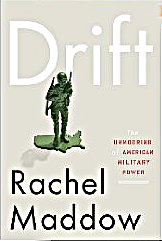 |
|
Dr Maddow chronicles the steady march down the very path Ike warned
us about. It’s very much a bipartisan story – both parties
have been guilty of dragging us ever closer to a continuous state of
war.
Return to Main
Directory |
|
 |
|
Physics of the Future:
How Science Will Shape Human Destiny and Our Daily Lives by the Year
2100
by Michio Kaku, Ph.D.
Published by Doubleday (2011)
Available in hardcover, paperback, Kindle, and audio book
Dr Kaku is a professor of
theoretical physics in the City College of New York He is the
co-founder of string field theory, a popularizer of science
and has made frequent appearances on radio, television, and film.
[For this review, I will use
Dr. Kaku’s words almost exclusively. My own words will be in
brackets.] |
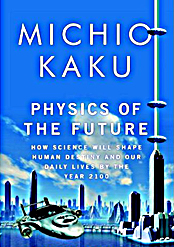 |
|
This book will closely examine the
work of the leading scientists who are building prototypes of the
technologies that will change our future. This book is not a work of
fiction, a by-product of the overheated imagination of a Hollywood
scriptwriter, but rather is based on the solid science being
conducted in major laboratories around the world today.
This book is based on interviews
with more than 300 top scientists, those in the forefront of
discovery. Every scientific development mentioned in this book
is consistent with the known laws of physics. Prototypes of all
technologies mentioned in this book already exist. This book
is written by an “insider” who has a firsthand look at the
technologies that are on the cutting edge of research.
2100: BECOMING THE GODS OF
MYTHOLOGY
Today, if we could somehow visit
our ancient ancestors and show them the bounty of modern science and
technology, we would be viewed as magicians. With the wizardry of
science, we could show them jet planes that can soar in the clouds,
rockets that can explore the moon and planets, MRI scanners that can
peer inside the living body, and cell phones that can put us in
touch with anyone on the planet. If we showed them laptop computers
that can send moving images and messages instantly across the
continents, they would view this as sorcery. But this is just the
beginning. Science is not static.
Science is exploding exponentially
all around us. If you count the number of scientific articles being
published, you will find that the sheer volume of science doubles
every decade or so. Innovation and discovery are changing the entire
economic, political, and social landscape, overturning all the old
cherished beliefs and prejudices.
Now dare to imagine the world in
the year 2100.
By 2100, our destiny is to become
like the gods of mythology that once were worshipped and feared. But
our tools will not be magic wands and potions but the science of
computers, nanotechnology, artificial intelligence, biotechnology,
and most of all, the quantum theory, which is the foundation of the
previous technologies.
By 2100, like the gods of
mythology, we will be able to manipulate objects with the power of
our minds. Computers, silently reading our thoughts, will be able to
carry out our wishes. We will be able to move objects by thought
alone, a telekinetic power usually reserved only for the gods. With
the power of biotechnology, we will create perfect bodies and extend
our life spans. We will also be able to create life-forms that have
never walked the surface of the earth. With the power of
nanotechnology, we will be able to take an object and turn it into
something else, to create something seemingly almost out of nothing.
We will ride not in fiery chariots but in sleek vehicles that will
soar by themselves with almost no fuel, floating effortlessly in the
air. With our engines, we will be able to harness the limitless
energy of the stars. We will also be on the threshold of sending
star ships to explore those nearby.
Although this godlike power seems
unimaginably advanced, the seeds of all these technologies are being
planted even as we speak. It is modern science, not chanting and
incantations, that will give us this power.
[The
book is divided in to these eight chapter/subjects. Each chapter is
subdivided into three time frames – the near future (now to 2030),
the mid-term (2030 to 2070) and the far future (2070 to 2100)]
THE COMPUTER: Mind over Matter
ARTIFICIAL INTELLIGENCE: Rise of
the Machines
MEDICINE: Perfection and Beyond
NANOTECHNOLOGY: Everything from
Nothing?
ENERGY: Energy from the Stars
SPACE TRAVEL: To the Stars
WEALTH: Winners and Losers
HUMANITY: Planetary Civilization
[Ending with] A DAY IN THE
LIFE IN 2100
JANUARY, 2100, 6:15 A.M. After a
night of heavy partying on New Year’s Eve, you are sound asleep.
Suddenly, your wall screen lights up. A friendly, familiar face
appears on the screen. It’s Molly, the software program you bought
recently. Molly announces cheerily, “John, wake up. You are needed
at the office. In person. It’s important.” “Now wait a minute,
Molly! You’ve got to be kidding,” you grumble. “It’s New Year’s Day,
and I have a hangover. What could possibly be so important anyway?”
Slowly you drag yourself out of
bed and reluctantly head off to the bathroom. While washing your
face, hundreds of hidden DNA and protein sensors in the mirror,
toilet, and sink silently spring into action, analyzing the
molecules you emit in your breath and bodily fluids, checking for
the slightest hint of any disease at the molecular level.
Leaving the bathroom, you wrap
some wires around your head, which allow you to telepathically
control your home: you mentally raise the temperature of the
apartment, turn on some soothing music, tell the robotic cook in
your kitchen to make breakfast and brew some coffee, and order your
magnetic car to leave the garage and be ready to pick you up.
As you enter the kitchen, you see
the mechanical arms of the robotic cook preparing eggs just the way
you like them. Then you put in your contact lenses and connect to
the Internet. Blinking, you see the Internet as it shines onto the
retina of your eye. While drinking hot coffee, you start scanning
the headlines that flash in your contact lenses.
Suddenly, one item catches your
eye:
A large leak has unexpectedly been
detected in the dikes surrounding Manhattan. Unless the dikes are
repaired, the entire city could be submerged, like scores of other
cities in the past.
“Uh-oh,” you say to yourself. “So
that’s why the office called and woke me up.” You skip breakfast,
dress, and dash out the door. Your car, which drove itself out of
the garage, is waiting for you outside. You telepathically order the
car to take you to your office as quickly as possible. The magnetic
car instantly accesses the Internet, the GPS, and billions of chips
hidden in the road that constantly monitor traffic. …
[An entraining and illuminating read. I enjoyed it
immensely.]
Return to Main
Directory |
|
 |
|
King Solomon’s Ring:
New Light on Animals' Ways
By Konrad Lorenz
Originally published in German in 1949 and in
English in 1952
Available in hard cover, paperback and Kindle
Dr. Lorenz was one of
the founding fathers of modern ethology. He won Nobel
Prize in 1972.
I first read this
marvelous little book as a college student in the ‘50s shortly after
its English publication. Now, almost 60 years later, I was
delighted by it once again. |
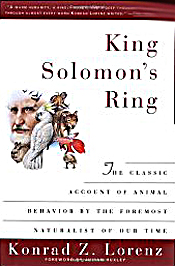 |
|
Besides being
informative about the lives of animals, it is delightfully amusing,
even downright funny in places. His stories of his
interactions with animals are timeless. As I read about his
interactions with animals, many times I thought "Gee, I wish I could
do that."
Because this book
was so influential in changing our understanding of animals, much of
what he writes is now common knowledge. We forget that many of
these things were not always known..
Lorenz explains clearly and concisely why most people feel sorry for
captive animals for all the wrong reasons. This section should be
required reading for most people who think that they are promoting
'animal rights'.
We
know that many birds have mating rituals, but did you know some fish
do too?
If
you are interested in animals, especially birds, you’ll be well
rewarded by reading this book.
Return to
Main Directory |
|
 |
|
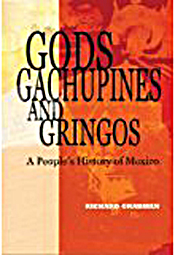 |
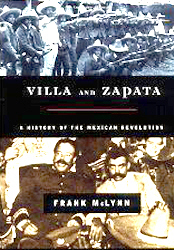 |
|
Gods, Gachupines and Gringos:
A People's History of Mexico
by Richard Grabman
Available in paperback and Kindle |
Villa and Zapata A History of the
Mexican Revolution
by
Frank McLynn.
Available in hard cover, paperback and Kindle
|
|
I have read, or tried to read, other histories of
México and the revolution, but none has spoken to me the way these
two have. I commend them to the attention of anyone who would like
to know more about México.
I have chosen to review them together because
they compliment each other, and each is a popular, non technical,
look at the history of México. Both books are comfortable
reads with many little side details that add much to the stories
they tell.
Grabman's book is a broad scope from
pre-Colombian times through about 2006. McLynn focuses on the
Revolution 1910-1920 with a bit of pre-revolution background.
Both books cover the revolution, but McLynn is able to paint a more
detailed picture of the main characters in the struggle -- many more
than just Villa and Zapata. I was especially drawn to McLynn's
story because so much of it took place in and around where I live in
northern México.
This is part of a review of
Gods, Gachupines and Gringos by
Alex Gesheva for the Guadalajara Reporter (11/08)
"Grabman has written this book with a specific
goal: to explore Mexico's multi-faceted, multi-cultural past and to
help foreigners become more familiar with a very ancient society.
The quirky details, therefore, serve to smooth encounters with
maddeningly complicated episodes of Mexican history that could
otherwise alienate and befuddle uninitiated readers. In this case,
the knowledge is also extremely relevant to understanding Mexico's
geopolitical present."
"As a non-academic writer for a general audience,
Grabman unhesitatingly selects the most compelling details of
Mexico's long and convoluted history and uses them to turn a
difficult story into a joyful, dynamic read. After all,
self-professed serious readers still yearn to learn about dental
care under Aztec rule, swashbuckling nuns, the Pastry War of 1838,
Francisco Madero's conversations with the ghost of his dead brother,
and President Jose Lopez Portillo's famous, ill-fated comment
involving a dog."
Villa and Zapata: The Revolution was a
very complex event that is still hard to understand a hundred years
later. McLynn has done a masterful job of presenting a clear
story of this tumultuous period. He begins the story with
President Juárez followed by the rise to power of dictator Porfirio
Dias. It was the long, brutal and corrupt rule of Dias that finally
triggered the revolution.
The cast of important characters in the politics
and military affairs during those 10 years was large, and the
conflicts and mistrust among them, combined with their differing
objectives and views of what Mexico should become, were exceedingly
complex; temporary alliances sprang up and broke up, various leaders
betrayed other leaders, and at times there was no real government at
all. Few of the main players lived long enough to provide
perspective; they shot one another with great enthusiasm.
This book provides a clear, well-written account
of who did what to whom, how and why, during the years of the
Mexican revolution.
Return to
Main Directory |
|
 |
|
A Planet of Viruses
by Carl
Zimmer
University of Chicago Press
Available in hard cover and various
e-book formats.
This little book by Carl Zimmer is
collection of 10 fascinating essays about viruses -- bad ones, good
ones and indifferent ones. The bad ones we know -- Small Pox,
HIV, various influenzas, West Nile, etc. I was surprised by a
couple of the good ones. Viruses make about 10% of the oxygen
we breathe. |
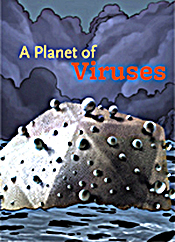 |
There are viruses that kill bacteria.
The overwhelming majority of
viruses do not affect our lives at
all.
I
found the story of viruses that kill
bacteria most interesting.
Bacteriophages, or more commonly
Phages, were used to treat bacterial
infections from the time of WW1
until the discovery of antibiotics
which were more effective.
Today, with so many bacteria
becoming drug-resistant, researches
are looking again at phages and
finding ways to enhance their
effectiveness.
"The
Global Viral Forecasting Initiative
is trying to change the
way we fight viruses. Someday,
somewhere, a virus we don’t know
about is going to emerge as a major
new threat to human health. We’ve
seen it happen many times before,
and so we know it will happen again.
GVFI scientists think we’ll do a
better job fighting that new virus
if we can learn something about it
in advance. To eliminate the
advantage of surprise, GVFI
scientists are looking for these
viruses before they jump into
humans. The best place to look for
them is in animals, such as the
monkeys."
"Viruses are the smallest living
things known to science, and yet
they hold the entire planet in their
sway. Viruses have been a part of
our lives for so long, in fact, that
we are actually part virus:
the human genome contains more DNA
from viruses than our own genes.
Meanwhile, scientists are
discovering viruses everywhere they
look: in the soil, in the ocean,
even in deep caves miles
underground. A Planet of Viruses explores
how viruses regulate the biosphere,
how they helped give rise to the
first life-forms, how viruses are
producing new diseases, how we can
harness viruses for our own ends,
and how viruses will continue to
control our fate for years to come."
The
essays in this book were written for
the World of Viruses project at the
University of Nebraska, funded by
the National Center for Research
Resources at the National Institutes
of Health through the Science.
http://www.worldofviruses.unl.edu/
Carl
Zimmer writes about science for the
New York Times and other
publications and is the author of
eight books, including Parasite
Rex, Soul Made Flesh, and
Microcosm. He is a lecturer at
Yale University, where he teaches
writing about science and the
environment, and visiting scholar at
the Science, Health, and Environment
Reporting Program at New York
University’s Arthur L. Carter
Journalism Institute.
Return to
Main Directory |
|
 |
| |
|
|
|
| |
| |
| |
| |
| |
| |
| |
| |
| |
| |
| |
| |
| |
| |


















